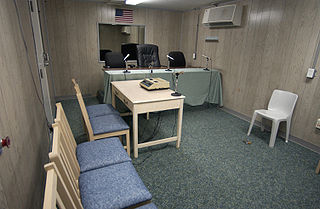
The Combatant Status Review Tribunals (CSRT) were a set of tribunals for confirming whether detainees held by the United States at the Guantanamo Bay detention camp had been correctly designated as "enemy combatants". The CSRTs were established July 7, 2004 by order of U.S. Deputy Secretary of Defense Paul Wolfowitz after U.S. Supreme Court rulings in Hamdi v. Rumsfeld and Rasul v. Bush and were coordinated through the Office for the Administrative Review of the Detention of Enemy Combatants.
Abdulla Majid Al Naimi is a Bahraini, formerly held in extrajudicial detention in the United States Guantanamo Bay detention camps, in Cuba.
Majid Mahmud Abdu Ahmad is a citizen of Yemen who was held in extrajudicial detention in the United States Guantanamo Bay detainment camps, in Cuba. His Guantanamo Internee Security Number is 41. The Department of Defense reports that he was born on June 15, 1980, in Al Buraiqeh District, Yemen.
Abdul Aziz Adbullah Ali Al Suadi is a Yemeni citizen who was held in extrajudicial detention in the United States Guantánamo Bay detainment camps, in Cuba, from May 3, 2002, to January 21, 2016. His Guantanamo Internment Serial Number is 578. The Department of Defense reports that Al Suadi was born on June 16, 1974, in Milhan, Yemen.
Mishal Awad Sayaf Alhabiri is a citizen of Saudi Arabia, who was held in extrajudicial detention in the United States Guantanamo Bay detention camps, in Cuba. His Guantanamo Internment Serial Number was 207. American intelligence analysts estimate he was born in 1980, in Minawara, Saudi Arabia.
Abdullah Mujahid is a citizen of Afghanistan who is still held in extrajudicial detention after being transferred from United States Guantanamo Bay detainment camps, in Cuba — to an Afghan prison.
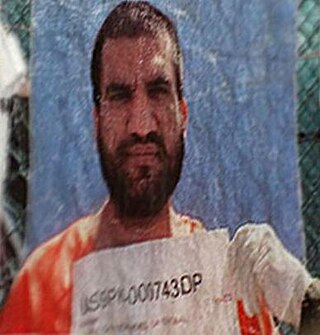
Muhammad Saad Iqbal is a Pakistani citizen who was held in extrajudicial detention in the United States Guantanamo Bay detention camps, in Cuba. Madni's Guantanamo Internment Serial Number was 743. The Department of Defense reports that he was born on October 17, 1977.
Ahmed Adil is a citizen of China who was held in extrajudicial detention in the United States Guantanamo Bay detainment camps in Cuba.
Starting in 2002, the American government detained 22 Uyghurs in the Guantanamo Bay detainment camp. The last 3 Uyghur detainees, Yusef Abbas, Hajiakbar Abdulghupur and Saidullah Khali, were released from Guantanamo on December 29, 2013, and later transferred to Slovakia.
Sami Abdul Aziz Salim Allaithy Alkinani is an Egyptian professor who was held in the Guantanamo Bay detention camps, in Cuba. His Guantanamo Internment Serial Number was 287. Analysts reported that he was born on October 28, 1956, in Shubrakass Egypt. He was repatriated to Egypt on September 30, 2005. He was later classified by the United States Department of Defense as a no longer enemy combatant.
Ali Abdul Motalib Awayd Hassan Al Tayeea is a citizen of Iraq who was held in extrajudicial detention in the United States's Guantanamo Bay detention camps, in Cuba. His Guantanamo Internment Serial Number was 111. The Department of Defense reports that Al Tayeea was born in Baghdad, Iraq. The Department of Defense provided a birthday, or an estimated year of birth, for all but 22 of the 759 detainees. Al Tayeea is one of those 22. He was repatriated on January 17, 2009, after more than seven years without ever been charged.

Mohammed Ahmed Said Haidel is a citizen of Yemen, who was held in extrajudicial detention in the United States Guantanamo Bay detention camps, in Cuba. His Guantanamo Internment Serial Number is 498. Joint Task Force Guantanamo counter-terrorism analysts estimate that he was born in 1978, in Ta'iz, Yemen.
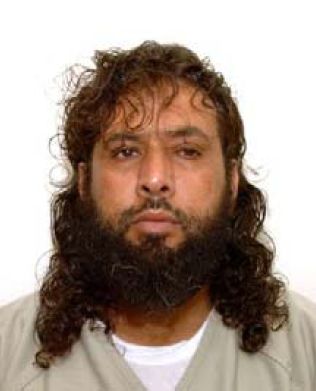
Omar Khalifa Mohammed Abu Bakr Mahjour Umar is a citizen of Libya who was held in extrajudicial detention in the United States' Guantanamo Bay detention camps, in Cuba, from August 5, 2002, until April 4, 2016. Abu Bakr's Guantanamo detainee ID number is 695. American intelligence analysts estimate that Abu Bakr was born in 1972 in Al Bayda [sic], Libya.

Ibrahim Othman Ibrahim Idris was a citizen of Sudan, formerly held in extrajudicial detention in the United States' Guantanamo Bay detainment camps, in Cuba. His detainee ID number was 036.
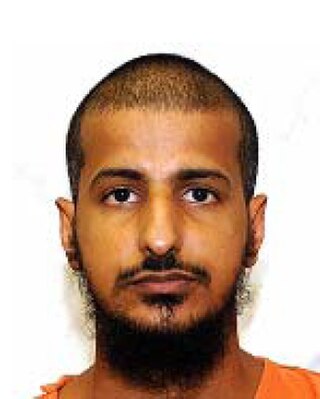
Tarek Ali Abdullah Ahmed Baada is a citizen of Yemen, who was formerly held in extrajudicial detention in the United States Guantanamo Bay detainment camps, in Cuba. His detainee ID number is 178. Joint Task Force Guantanamo counter-terrorism analysts estimated that Baada was born in 1978 in Shebwa, Yemen.
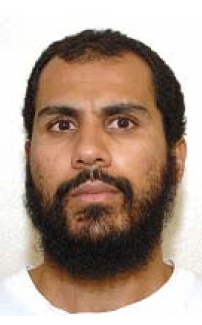
Zahar Omar Hamis Bin Hamdoun is a citizen of Yemen, held in extrajudicial detention in the United States Guantanamo Bay detainment camps, in Cuba. His Guantanamo Internment Serial Number is 576. The Department of Defense reports that he was born on November 13, 1979, in Ash-Shihr, Yemen.

Sharqawi Abdu Ali al-Hajj, also known as Riyadh the Facilitator, is a Yemeni alleged Al-Qaeda associate who is currently being held in the United States' Guantanamo Bay detention camps, in Cuba. He is accused of being a 'senior al-Qaida facilitator who swore an oath of allegiance to and personally recruited bodyguards for Osama Bin Laden.

Omar Said Salim Al Dayi, also known as Omar Said Salem Adayn and Omer Saeed Salem Al Daini, is held in extrajudicial detention in the United States Guantanamo Bay detention camps, in Cuba. His Guantanamo Internee Security Number is 549.

Abdul Latif Nasir is a Moroccan man formerly held in administrative detention in the United States Guantanamo Bay detention camps, in Cuba. His Guantanamo Internment Serial Number was 244. Joint Task Force Guantanamo counter-terrorism analysts report he was born on March 4, 1965, in Casablanca, Morocco. Abdul Latif Nasir and Sufyian Barhoumi tried to file emergency requests to be transferred from Guantanamo in the final days of Barack Obama's presidency.
Rafiq Bin Bashir Bin Jalud al Hami is a citizen of Tunisia, who was formerly held for over seven years without charge or trial in the United States's Guantanamo Bay detention camps, in Cuba. His Guantanamo Internment Serial Number was 892. The Department of Defense reports that he was born on 14 March 1969, in Tunisia.











